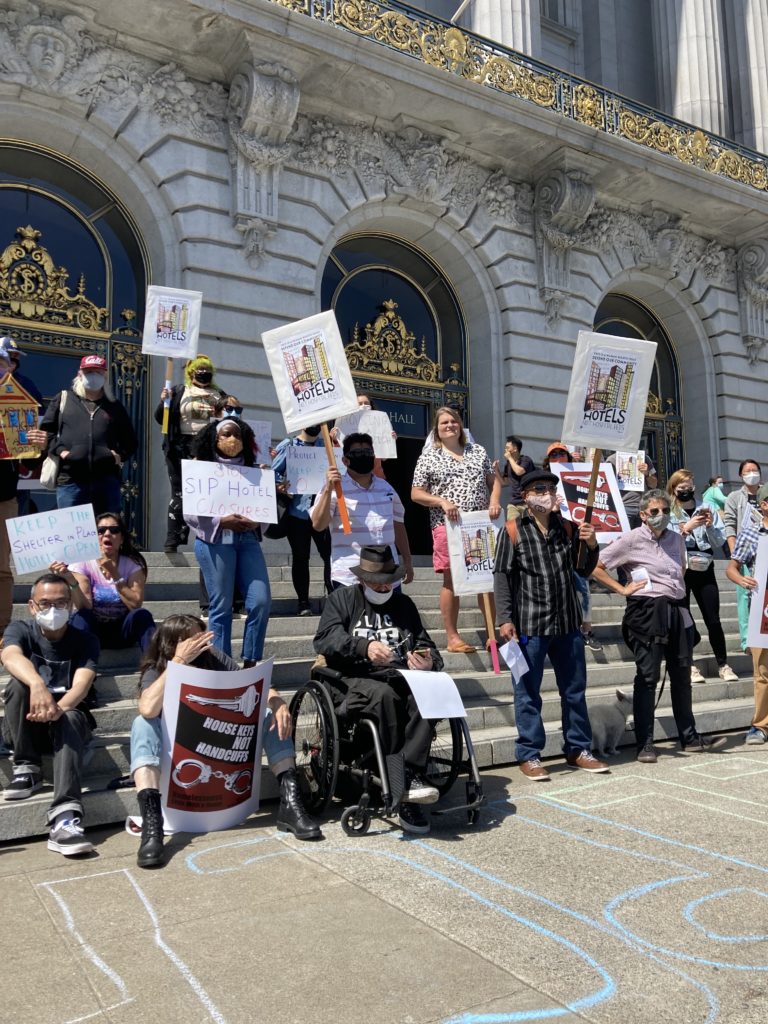Disease does not care about class divisions or housing status. If you leave anybody vulnerable to COVID-19, you increase your whole city’s vulnerability to COVID-19. When you increase access to stable, humane housing, you increase the health of your city. When you support and prioritize the health of your friends and community members who are experiencing homelessness, you support and prioritize the health of your healers in the hospitals and the health of those organizing in the community.
My name is Lina Khoeur. I currently live on occupied and unceded Ramaytush Ohlone lands. I am a member of the Do No Harm Coalition and a fourth-year medical student at UCSF, where I am learning from and providing care for our communities. As a healthcare provider, a researcher and an organizer, I have studied the impacts of city policies on our unhoused community and our city’s health.
We continue to work to meet the increasing challenges of a pandemic, economic instability and climate crisis, all of which feed into each other and manifest as the diseases I see in the hospital, in the clinic and in our community. As a city, we all hope for a healthier future, and it takes radical imagination and transformative justice to get there. The first step, and the baseline, is to make sure that everyone’s basic needs are met.

As part of the Do No Harm Coalition, I, along with hundreds of other providers in San Francisco, applaud the City’s efforts to relocate current shelter-in-place (SIP) hotel residents to permanent housing. And just like each of us continues to anticipate, adapt to, and creatively meet the challenges of COVID-19, we must continue to create and implement solutions that center our city’s healing. What if we all worked as hard to eradicate the causes of homelessness as we all are working to eradicate COVID-19? Just as social distancing and wearing masks is a preventative measure, expanding shelter-in-place hotels is a preventative measure.
Mayor London Breed, the San Francisco Board of Supervisors, and the Department of Homelessness and Supportive Housing, you have all made life-saving progress in bringing together different agencies, folks managing hotels, secondary service providers, care coordinators, and healers in the creation of SIP hotels. This work saves lives. As people are relocated into permanent housing, newly empty hotel rooms need to be made available for people who are still on the streets or in congregate shelter. And more hotels should be acquired by the City to ensure every community member experiencing homelessness has the option for safe shelter.
SF community, the challenges you face are too urgent for you to slow or stop the work. By the time a patient has come through the hospital doors, there is only so much that I can do. Even as a medical student at the beginning of my career, I have already had to discharge more patients onto the street than I ever wanted to, often with crucial medications for kidney failure, heart disease or infections. I never know if they will be able to stay healthy, if their medications will be stolen or confiscated in sweeps, if they will be able to get long-term, sustainable health care. I still worry about what I did not and could not do for their whole health. But SIP hotels have done what I could not do alone: In these hotels, I have seen patients with diabetes keep healthy blood sugar levels for the first time, stay on crucial medications for addiction treatment, and get long-term mental health care. Our community has the power to create and implement solutions that heal COVID-19, that close the wounds of classism, racism and neglect that harm all of us. We keep each other safe. Expanding SIP hotels keeps us all safe.

